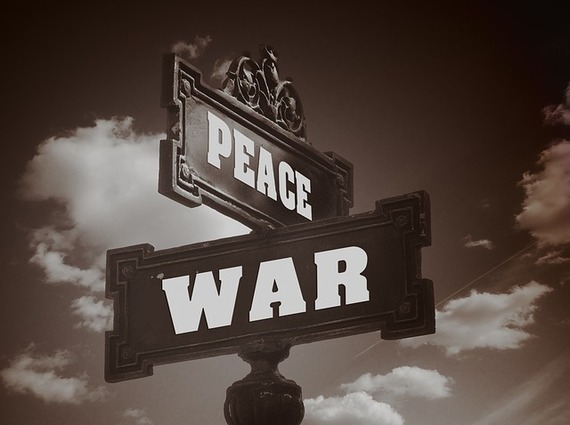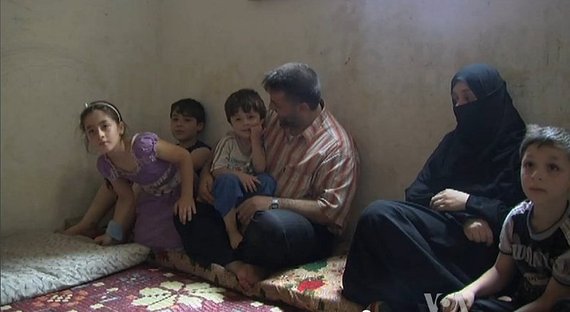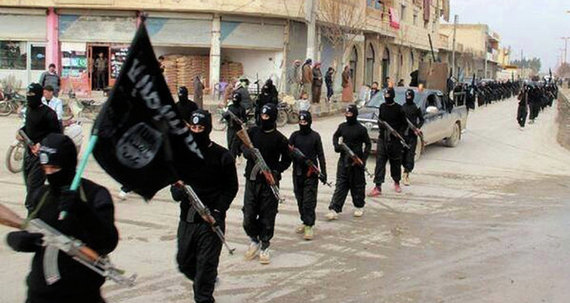Today I have the opportunity to interview Emilie Kao, co-founder and Executive Director of Kids World, who has just posted a blog titled "War of Dreams" noting the importance of providing a human rights-based alternative to individuals considering violent jihad.*
1.Emilie, Brussels just experienced a tragic terror attack and more than 30 innocent civilians are dead. Isn't there a contradiction between wanting to fight terrorism and urging greater respect for the human rights of Muslims?
No, Ed that's a false dichotomy. We can protect the innocent by focusing our ideological strategy on increasing dialogue about ideas within Muslim communities. Human rights are the infrastructure for those dialogues. Only when all people, regardless of sect, gender or age, can seek out the truth and speak out about what they believe, can that society advance towards pluralism and peace. I would argue that the freedom of Muslims to dialogue is absolutely fundamental to their ability to promote peace and to support alternatives to radical jihad. This is the most effective long-term security strategy. Ideas are the roots, behaviors the fruit. The problem with approaches to security that actually silence certain groups according to their identity (in this case Muslims) is that injustice and exclusion always radicalize. That's why the Western voices that are calling for exclusion of Muslims are so dangerous and counter-productive.
2.You talk about the right to an education and the right to freedom of religion, but isn't religion, especially Islam, what often keeps children, especially girls, from getting a liberal education? Isn't it what also channels them towards violent jihad? 
There is a difference between supporting the right to education and endorsing all forms of education. I don't endorse the right to teach violent jihad. But, I think the way to connect these dots is to see that the freedom to learn about all ideas, including religious ideas, allows children to search for truth. A real faith can only be found through genuine searching and that only happens when one has the freedom to search for the truth. This is what my old boss Seamus Hasson at the Becket Fund for Religious Liberty meant when he described "the right to be wrong." If you care about your own ability to seek the truth, you also have to care about the right of other people to seek the truth, even if you end up thinking that they're wrong and they end up thinking the same about you.
When I was at the Becket Fund, I accompanied a French Muslim girl to the United Nations in Geneva to share her story before the Human Rights Commission (now the Council). Cennet Dogannay was 15 years old at the time and attending a public high school. France had just enacted its ban on all religious symbols in the public square. School officials told that her headscarf was overtly religious and that she had to remove it to continue attending class with other students. Being a Muslim girl who wanted to remain modest according to her religious beliefs and a teenager, she came up with the ingenious and drastic solution of shaving her head. The school let her back in, but she was exposed to ridicule and contempt throughout and had to spend significant time in isolation from other classmates. Banning peaceful expressions of religious belief and preventing people from following their consciences to fight against violent extremism is so counterproductive. Cennet said of her treatment, "I respect the law but the law doesn't respect me."
I empathize with France's revolution and their profound distaste for religious institutions controlling the state. This history is what gave birth to their policy of laicité (radical secularism). But in response to the massive influx of Muslim migrants, they adopted policies that stigmatize an entire group according to their religious identity. It's been an unwise choice.
3. Isn't there also a danger of going too far to the other side and loosening one's laws to allow the infiltration of Muslim values at the expense of corrupting traditional philosophical and belief systems in the West that are the foundation for rule of law and human rights?
Yes, that is a real danger. France erred because it conflated peaceful behavior with threatening and violent behavior. They should have focused not on Cennet's Muslim identity, but on whether her actions posed a threat to society, which they didn't. The introduction of ideas and behaviors that will actually weaken human rights protections is something that governments must firmly oppose. British Prime Minister David Cameron has bravely identified the dangers of radical, violent Islamist ideology to their country's Judeo-Christian culture and system of law and rights protections. However, Britain's Parliament has permitted separate Shari'a courts for Muslims in which women are treated as inferior and unequal. The principle of impartiality should be applied across the board. Religious people should not be treated as a suspect class because of their beliefs. But, neither should ideas and acts that undermine safety be exempt from scrutiny because they are rooted in religious beliefs. The yardstick should be whether the ideas or actions pose harm to the citizens of the country.
The Coalition fighting radical jihad should avoid either radical secularism or ill-fated compromises in the name of multiculturalism that endanger the vulnerable. Radical inclusion of all peaceful ideas, beliefs, and religions avoids both errors.
4. Isn't it true that President Obama's refusal to call Daesh "Islamic" is a huge strategic error that has prevented us from treating the threat of radical Islam with enough seriousness and aggressiveness?
The Coalition absolutely needs to address the role of Daesh's religious ideology/political theology (Jihadi-Salafism). Reading Mein Kampf gave leaders during World War 2 strategic understanding of Hitler's aims. Leaders today bear a duty to understand the political theology of "Caliph" Abu Bakr al-Baghdadi in order to predict and thwart Daesh's genocidal and territorial ambitions. Nazi ideology was a monumental danger to Jews and other minorities, including Germans who opposed Nazism. Similarly, violent jihadist ideology is an existential threat to religious minorities, to women and children, and to Muslims who oppose Daesh. We have a duty to scrutinize the ideology of violent jihadist groups to protect the innocent, many of whom are Muslim.
At the same time, government leaders should tread very cautiously in their public comments about orthodoxy (the validity of religious interpretation), especially when they address religions they themselves do not follow. Both President Obama and President Bush acted with noble intent to protect American Muslims by caling Daesh "un-Islamic" and Islam "a religion of peace," but they crossed a line. Law and its enforcement are the appropriate realms for presidents, governors and mayors. But orthodoxy is the realm of religious scholars, theologians, and clerics. The state has a duty to prosecute violent acts done in the name of religion and to prevent the spread of violent religious ideologies (e.g. Saudi textbooks containing violent  Salafi-Wahhabi rhetoric). But governments should respect the autonomy of religious groups by allowing religious leaders to decide what is or is not "orthodox." The founders of the United States established this country as a land where they could be free from governments establishing the terms of religious orthodoxy.
Salafi-Wahhabi rhetoric). But governments should respect the autonomy of religious groups by allowing religious leaders to decide what is or is not "orthodox." The founders of the United States established this country as a land where they could be free from governments establishing the terms of religious orthodoxy.
5. Aren't Muslims going to see a U.S-led call for human rights as disingenuous and a cover for the real purpose of controlling the global oil supply?
There are always going to be people who distrust our intent, but that is not a reason to avoid making human rights central to our message and the plumbline for our behavior.
It's true that we've supported oppressive dictatorships from the Mubarak regime to the Saudi and Iranian royal families and this seriously undermines our support of human rights. Citing human rights as a reason for our fight against violent jihadists will face skepticism. But, we should do it because it's right and wise. It's consistent with our own international legal obligations and it's strategic. Many have criticized our efforts to Counter Violent Extremism (CVE) as too negative. They point to things like the State Department Twitter feed which urges Muslims to "Think Again, Turn Away." People are starting to realize the need for a positive message. The former coordinator of U.S. counterterrorism communications acknowledged that Daesh has an advantage because the positive narrative is "always more powerful." But their message is positive largely because of appearance. They have fighters "dressed in black like ninjas, brandishing cool flags, and fighting for their people." The message of human rights is positive because of substance, that every individual should have opportunities to pursue their dreams. We need to strengthen that message and contextualize it for Millenial Muslims and deliver it in channels where they already receive information.
6. Why can't we focus on addressing the ideology of violent jihad after we defeat Daesh on the battlefield? The U.S. didn't come up with a Marshall Plan for Europe until after World War 2. Why is this urgent?
It's not often that Britain's Prime Minister David Cameron and Iran's President Hassan Rouhani agree on something, but both have recognized that "ISIS is not only a terrorist group, it's a wrong ideology." Therefore, "it cannot be destroyed by bombs." As Turkish scholar Ziya Meral writes, Daesh answers the greatest philosophical question of all..."why live?" We can't offer an effective alternative to a metanarrative like jihad just by offering "jobs." Many Daesh recruits in the West had jobs, but they gave them up for the spiritual goal of making hijra (pilgrimage) to the Caliphate. That's not just a dream of a higher salary and nicer car. Daesh speaks to the soul, not just the bank account. The U.S. Government doesn't need to speak to the soul. But it needs to promote freedom of thought, conscience, and religion so that people can have access to different ideas and make their own decisions about truth.
Defeating Daesh on the battlefield is like pulling one shoot off the weed. To eliminate the weed, the Coalition, the governments of the region, and civil society (especially religious leaders) must address the underlying issues. One of the most fundamental problems in the Middle East is sectarian prejudice that leads to discrimination and injustice. Ironically, this is also at the root of misguided Western responses that seeks to deny human rights to Muslims on the basis of their religious identity.
The best antidote to both forms of exclusion is "radical inclusion." In a climate of terror, it is so easy to react with anger towards those threatening us. The anger is justified, but when our response mirrors the problem, we actually feed it.
7. Finally, why would human-rights-based countries like the US and France be attractive to potential radical jihadists when they produce political leaders like Donald Trump and Marine Le Pen, who want to exclude Muslims from their countries, even though they might be considered "radical inclusive" societies? Isn't there an issue of not practicing what we preach?
Leaders like Le Pen and Trump who preach exclusion based on identity are not attractive to Muslims. They alienate Muslims who are fighting against violent jihad and they fuel the anti-Western narrative of Daesh. One of the reasons why Daesh has grown so much faster than al-Qaeda is due to the unparalleled success of its global recruitment efforts. Key to Daesh's ability to recruit more Muslims from more places it the establishment of the Caliphate which allowed it to surpass al-Qaeda in its spiritual legitimacy. One of the most appealing aspects of the Caliphate is that it hearkens back to the glory days of Islam during Mohammed's time and subsequent caliphates that lasted for over 1300 years. The end of Islam's status as a world power is largely associated with the rise of Colonialism. Daesh appeals to Muslims by promising that they can avenge the humiliation of Colonialism through attacks on the West. When leaders like Le Pen and Trump feed anti-Muslim prejudice, they actually reinforce what Daesh tells Muslims-- the West is against you and therefore you should be against the West. When we fail to see the battle within Islam, between violent jihad and its peaceful alternatives, we fall right into the trap of groups like Daesh.
Thanks, Emilie for these insightful comments.
*These are Ms. Kao's views, not the views of Kids World.